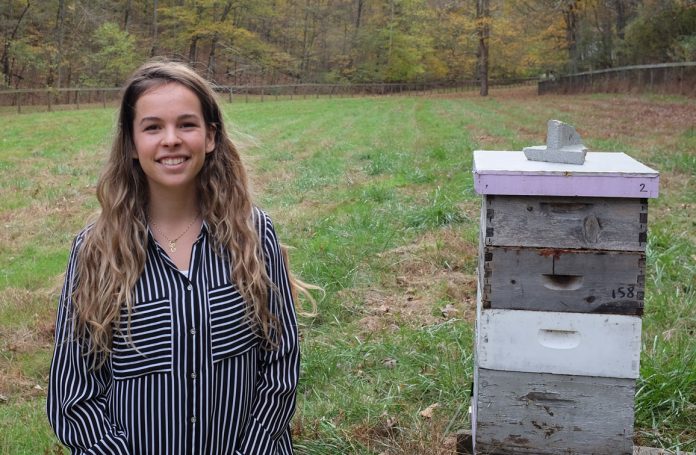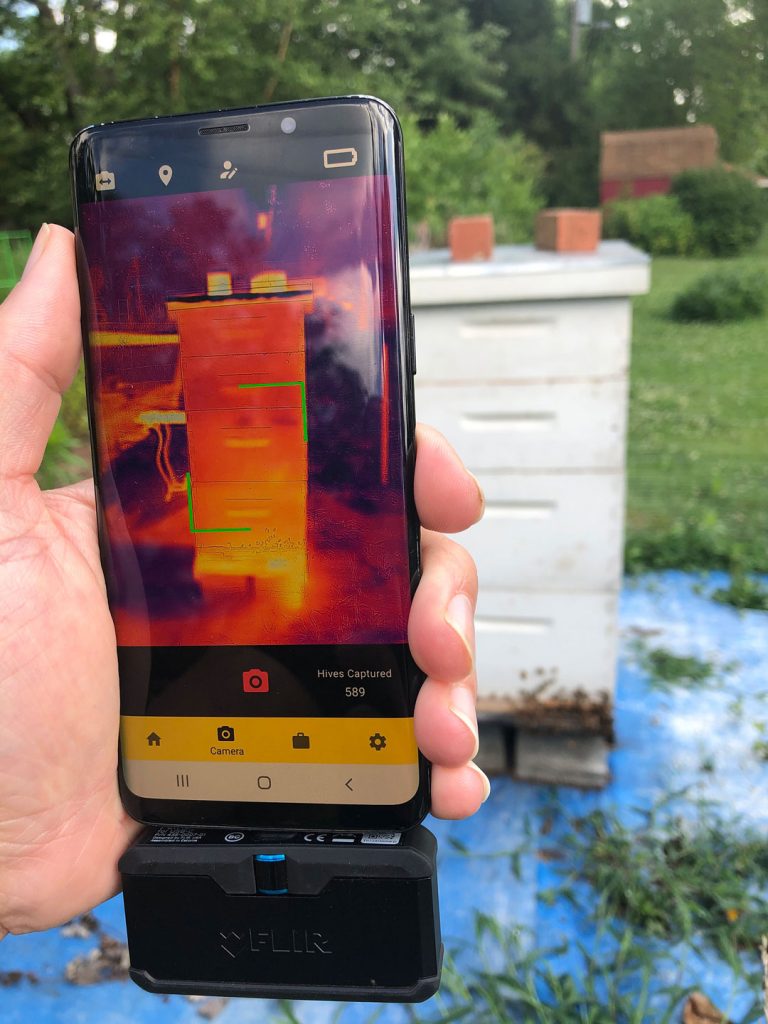
Editor’s Note: The following profile is an excerpt from Amy Wu’s book, “From Farms to Incubators: Women Innovators Revolutionizing How Our Food is Grown,” which tells the stories of women entrepreneurs who are transforming agriculture through high technology.
Ellie Symes could easily pass for the girl next door. The petite brunette, with her dimpled ear-to-ear smile, is affable and easy to converse with. Symes is in her mid-twenties, and her youthful persona not only makes her stand out in a sector known for being male-dominated but belies her expertise: she is a ninja when it comes to talking bees and bee pollination.
Symes launched her agtech company, The Bee Corp, in 2016. The Bee Corp offers a software platform that monitors and grades the quality of hives before pollination. The technology, delivered through a mobile app, helps beekeepers and growers make sure their hives are healthy and ready to go. The start-up includes Symes and a small team of engineers and researchers who are based in Indianapolis, Indiana.
At the Forbes AgTech Summit in Indianapolis in 2018, she held the stage during the “Show Me the Honey: Innovating to Insure Healthy Bees and Honey” panel. During the question-and-answer portion before an audience made up of top executives, Symes fielded a question on what her company’s technology is taking pictures of. She explained that the Bee Corp’s Verifli is an infrared image analysis tool that helps growers measure pollination value. It captures an infrared image of the clusters of bees inside the hive box from a device that is attached to the user’s smartphone.
“It’s an infrared image and we are reading thermal heat coming off the hives, produced from the body heat of the bees. The bees are actually creating body heat to heat the eggs, just like a bird sits on a nest,” Symes said. Once the image is uploaded, a prediction of hive strength is made in four seconds and shared with growers.
The company’s tagline is “Snap. Grade. Go about your day.” “We focus on inspection and ensure growers they have strong hives and make sure they measure their pollination contracts. We can inspect earlier in pollination and be able to make decisions,” Symes said, noting that the technology is such that the process does not require the hive boxes to be open, thereby avoiding manual inspection.

Something new
Symes was an undergraduate at Indiana University in Bloomington when she began working on the project that would later become The Bee Corp. She has no farming background and fell into both entrepreneurship and agriculture. At the end of her freshman year, as she was looking beyond the prospect of lifeguarding again in the summer, Symes began researching internship opportunities in areas of the environment and ecology: “My goal [at the time] was to build a career and get the studies I needed to solve environmental problems.”
A beekeeping internship piqued her curiosity. “It was something new and different,” she recalls. Little did she expect that she’d get hooked on beekeeping.
She returned to Indiana University that fall with the idea of starting a beekeeping club and program, thinking that it would be a good intersection between agriculture and technology. The club was colaunched by Symes and Wyatt Wells (the company’s chief marketing officer) and included other students. The club was a success, and eventually Indiana University Foundation board members approached Symes with an offer to help take the club to another level. They had also identified the challenges associated with honey bee health as an area they were keen on exploring further.
“They said we love what you’ve done with the club, but we want you to dream bigger, and we want to help you,” Symes says. “They saw a very energetic person who was very enthusiastic about honey bees. I think starting the club and beekeeping program was very entrepreneurial.”
The IU Foundation encouraged Symes — now enrolled in a master’s program at the university — and a small team of fellow students to enter the university’s BEST Competition, which awards a $100,000 prize. The business plan competition for Indiana University students is a partnership between the School of Informatics and Computing and the Kelley School of Business.
The team’s business plan, which centered around a company of tech-enabled beekeepers, took home the BEST Award. The award was a key milestone in that it allowed Symes and the team to launch a business plan and commence a round of funding. But in the face of real-world constraints, the plan soon evolved into other areas.
“We quickly realized that building a commercial beekeeping operation is really capital intensive and building sensors is silly,” Symes recalls. “Since then we’ve evolved the model several times.” During this time the team came up with the company name and decided to incorporate it.
Seeking problems and solutions
After graduating from Indiana University with a bachelor’s in environmental management and later a master’s degree in information systems, Symes and company took the idea of the initial product that tracks the life cycle of the hive and ran with it. Within two years of winning the BEST Competition, The Bee Corp launched Queen’s Guard, its first product designed for the pollination space. It also received $275,000 from a National Science Foundation Small Business Innovation Research grant to solve pollination problems, including the cost of pollination and quality of the beehives.
The grant allowed Symes to retain a team and also engage in a discovery phase. They set out to learn about some of the biggest challenges that almond growers faced, and they ended up conducting over one hundred interviews. One clear problem that growers face, for example, is the rising cost of pollination, which now even surpasses the cost of irrigation and harvest.
The information garnered was golden and helped the team narrow its focus and create Queen’s Guard, a product that used temperature sensors to determine whether the queen bee (which lays the eggs) was alive in a beehive or not. The team also launched a product named QGPS that uses encrypted GPS data to alert beekeepers and local authorities about stolen hives.
Pollination is vital to agriculture, and honeybees play an essential role as crop pollinators. Symes zeroed in on California almonds, which was a wise choice considering the breadth of that large market and the essential role pollination plays for almond growers.
California is by far the largest almond producer in the world, producing 80% of the world’s almonds and 100% of the U.S. commercial output. California’s Central Valley, with a climate that is favorable for almond growing, is the unofficial mecca of almond production. Statewide the crop is valued at nearly $6 billion annually, according to the Almond Board of California.
Honeybees and almonds are heavily dependent on each other as almond trees offer the bees a food source every spring. At the same time, almond trees are not easily wind pollinated and most varieties require cross-pollination (the transfer of one tree variety to another). California almond grower Stuart Woolf uses The Bee Corp’s software and says such technology helps him and other growers greatly as they often rent hives from beekeepers out of state. Hives are shipped in from all over the country for almond pollination, since there aren’t enough hives in California to do the job. This journey is often stressful for the hives, so it is important to check them upon arrival at California almond orchards to make sure they are strong enough to pollinate effectively.
Members of the fledgling Bee Corp team faced many hurdles: the company was a startup, it was not based in California, where most of the almond growers are, and it had a tough audience (farmers are some of the busiest people in the world). From their coworking space in Bloomington, Indiana, team members cold-called almond growers in California to establish relationships.
“Once they are on a phone, it’s not a problem. Honestly, it’s getting them on the phone [that is challenging]. You just have to catch them when they are driving in a truck,” Symes says, laughing. “We reached out just trying to learn about them. It’s a lot of time on the computer to find lists of people you can reach out to; it’s a lot of grit and follow-up.”
In February 2019 the company launched the above-mentioned Verifli.
Another company milestone was getting accepted into THRIVE, a competitive agtech accelerator run by SVG Ventures out of Silicon Valley. Symes credits the accelerator for helping connect The Bee Corp with major agribusiness players. Since then the company has been constantly tweaking its technology to meet the needs of growers. It has added filters for data sorting and a daytime value to account for the change in weather throughout the day. The technology helps beekeepers price their beehives and increase pollination effectiveness. The company considers manual inspectors its main competitor.
In September 2019 The Bee Corp won a second grant from the National Science Foundation in the amount of $750,000, which went toward boosting sales and developing a web app.
Looking globally
As of April 2020 The Bee Corp had six full-time staff and a small group of interns and closed another round of funding at $1 million. This was no small feat considering funding was at that time drying up for start-ups because of the Covid-19 crisis. Part of the funding came from a $250,000 injection from Indiana University’s IU Ventures group. “They [The Bee Corp] pursued beekeeping and solving problems for beekeepers out of passion,” said IU Ventures associate Samantha Ginther in the news release. “Through strategic utilization of grant funding, they converted that concept into a well-researched product.”
At the same time, the company had imaged over 28,000 beehives and completed its second pollination season with almond growers. Considering the global economic impact from the Covid-19 pandemic that gained speed that same month, Symes says it was fortunate the funding round and pollination season were complete. Almonds are also one of the least labor-intensive crops. “From a product standpoint we are unchanged,” she says.
At home in Indiana, Symes has gained a high profile in the media and within the world of agbio and agtech. She continues to sit on the board of AgriNovus Indiana, the state’s agbioscience economic development arm, and is focused on bolstering the agbioscience sector in Indiana by connecting the public and private sectors and entrepreneurs.
Although moving to California appears to make sense for The Bee Corp, considering its target market of almonds, Symes is committed to keeping the home base in Indiana, where she and her team enjoy a strong support network and lower business costs. They look forward to pursuing their goal of eventually extending their technology to crops all over the country. This is home. On the personal side, Symes notes she and her fiancé bought a house and are “having a lot of fun with the home projects!”
“We are thinking long-term and what is best for the business as a whole. While we are laser focused on almonds in California, we are working towards our next crop market,” Symes says matter-of-factly. “We are looking globally.” The sky is the limit for this high-spirited founder.
Amy Wu is an award-winning journalist and author of “From Farms to Incubators,” which was released on May 4 by Linden Publishing. For more information, go to farmstoincubators.com.









